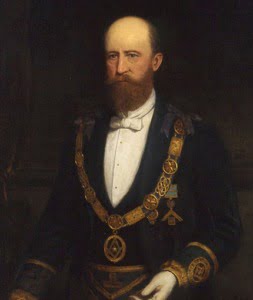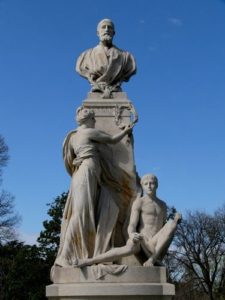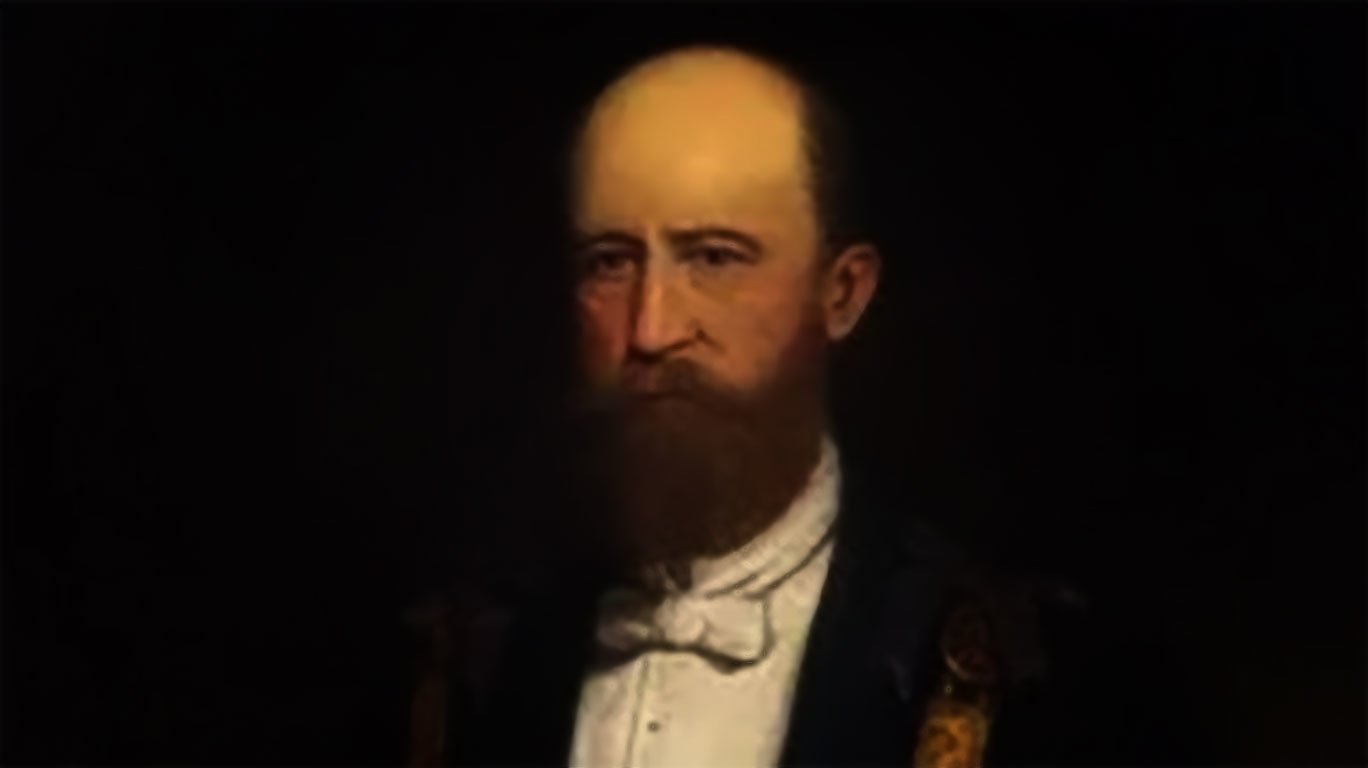
Sir William John Clarke, 1st Baronet (31 March 1831 – 15 May 1897), was an Australian businessman and philanthropist in the Colony of Victoria. He was raised to the baronetage in 1882, the first Victorian to be granted a hereditary honour.
Clarke was born in Van Diemen’s Land, the son of the pastoralist William John Turner Clarke. He arrived in the Port Phillip District (the future Victoria) in 1850, where he managed many of his father’s properties and acquired some of his own. Upon his father’s death in 1874, he became the largest landowner in the colony. Clarke was made a baronet for his work as the head of the Melbourne International Exhibition, which brought Australia to international attention. He also served terms as president of the Australian Club, president of the Victorian Football Association, and president of the Melbourne Cricket Club, and was prominent in yachting and horse racing circles. Clarke gave generously to charitable organisations, and also made significant financial contributions to the Anglican Diocese of Melbourne and the University of Melbourne. He was a member of the Victorian Legislative Council from 1878 until 1897, although he was not particularly active in politics.
Clarke first arrived in Victoria in 1850, when he spent a couple of years in the study of sheep farming on his father’s Dowling Forest station, and afterwards in the management of the Woodlands station on the Wimmera. For the next ten years he resided in Tasmania, working the Norton-Mandeville estate in conjunction with his brother, Joseph Clarke.
Clarke took some interest in local government and was chairman of the Braybrook Road Board. On the death of his father he found himself with a very large income, much of which he began to use for the benefit of the state. His largest gifts were £10,000 for the building fund of St Paul’s cathedral and £7000 for Trinity College, Melbourne University. In 1862 Clarke stood against George Higinbotham in the Brighton by-election for the Victorian Legislative Assembly, but was not elected. He was elected a member of the Victorian Legislative Council for the Southern Province in September 1878,but never took a prominent part in politics.
In 1862 Clarke assumed the management of his father’s concerns in Victoria, and on the latter’s death in 1874 succeeded to his estates in that colony. In the same year he was appointed president of the commissioners of the Melbourne international exhibition which was opened on 1 October 1880. In 1882 he gave 3000 guineas to found a scholarship in the Royal College of Music.
For many years Clarke bore the full expense of the Rupertswood battery of horse artillery at Sunbury, Victoria. Amongst Sir William Clarke’s other public donations are the gift of £2000 to the Indian Famine Relief Fund, of £10,000 towards building the Anglican Cathedral at Melbourne, and of £7000 to Trinity College, Melbourne University.

Clarke also took interest in various forms of sport, his yacht, the Janet, won several races, but he was not very successful on the turf; the most important race he won being the V.R.C. Oaks. He was the inaugural president of the Victorian Football Association, presiding from 1877 until 1882.
He was the patron of many agricultural societies and did much to improve the breed of cattle in Victoria. Before the Victorian department of agriculture was established he provided a laboratory for Ralph Waldo Emerson MacIvor, and paid him to lecture on agricultural chemistry in farming centres. In 1886, he was a member of the Victorian commission to the Colonial and Indian exhibition, and in the same year Cambridge gave him the honorary degree of LL.D.
Clarke was elected Provincial Grand Master of the Irish Constitution in 1881; he followed the late Mr. A. K. Smith in the office of District Grand Master of the Scotch Constitution; and on the demise of Captain Standish in 1883, Sir W. J. Clarke was offered the position of District Grand Master of the English Constitution, the Prince of Wales signifying his warm approbation.
The foundation stone of the Freemasons Hall in Melbourne was laid by him in March 1885, the finished building being consecrated by him to Masonic purposes in March 1887. In 1889 he became the very first Most Worshipful Grand Master of the United Grand Lodge of Victoria, an amalgamation of the three bodies that had operated at that time under their own constitutions. In 1885 he had largely financed the building of the Freemasons’ Hall at 25 Collins Street.
He was also the founder of the Freemasons Victoria Board of Benevolence Fund, making a personal donation of 500 pounds, a significant sum at that time. At the subsequent Quarterly Communication of the Grand Lodge of Victoria, the general membership raised an additional 126 Pounds and 7 shillings. These sums formed the original corpus of the Benevolent Fund. Today the capital stands at some $34 million. Capital preservation was assured as disbursements could only be made from the Fund’s income.
Clarke was a household name in Victoria. He made a few large donations but his help could constantly be relied on by hospitals, charitable institutions, and agricultural and other societies. He divided one of his estates into small holdings and was a model landlord, and he showed much foresight in allying science with agriculture by employing MacIvor as a lecturer.
